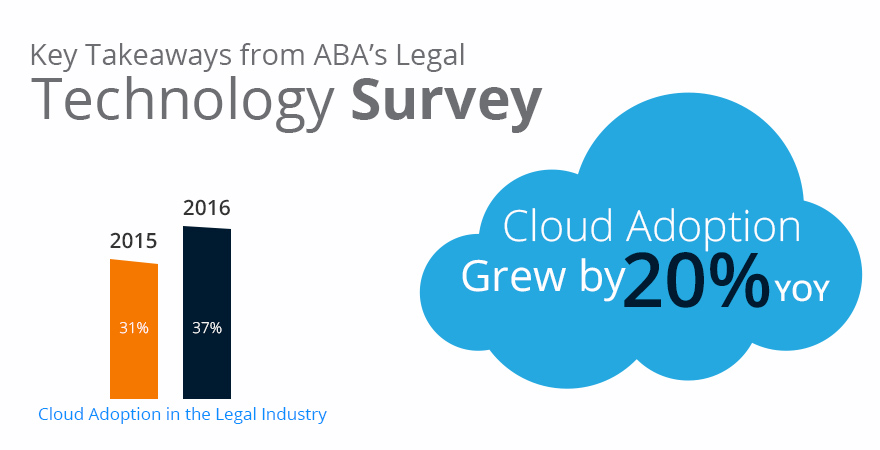According to the American Bar Association’s Legal Tech survey, there’s an entrance of new competition brought on by technology and a need for creativity in the legal industry. The traditional manner of providing legal services are drastically transforming as new tech entrants look to disrupt the field.
Read our coverage of the Tech Survey to stay informed of insights from the report, and to identify ways to manage your own digital transformation. How do you fare in the transformation?
Findings from ABA’s Technology Survey Report

The survey report on technology trends in the legal industry by American Bar association shows Cloud usage grew more than 20% in the last couple of years.
Lawyers who aren’t using cloud indicate a growing willingness to consider cloud and those already using it, don’t want to stop.
Members of the legal fraternity who have an experience of 10 to 19 years are leading the movement for cloud services.
The survey report indicates that as cloud adoption is increasing, the legal fraternity is becoming more comfortable with the technology and expanding their requirements to include mobility and security.
Mobility allows attorneys and those in the practice to connect and remain productive regardless of location and device type. For example, this allows an attorney to use their desktop at the office, and seamlessly transition to a laptop in the courtroom, and then work from home on another device.
While all the productivity from mobility is welcome, concerns over security are close in mind. Thus, as law firms look for cloud services or other forms of digital transformation, they are also having to learn about what types of security they can implement alongside it.
What to Expect Moving Forward
As lawyers look for ways to streamline and improve their day to day operations, we foresee the adoption of cloud, robotic automation and data analytics will increase.
By taking advantage of the flexibility offered by cloud-based legal practice management software, law firms can efficiently and effectively run their law practice at a lower cost. Modern software facilitates collaboration between litigation teams enabling them to collaborate and share notes about their cases in secure web-based platforms.

Advances in AI (artificial intelligence) and robotic automation (such as virtual robots) are reducing repetitive tasks, new technologies like the virtual robot will assist lawyers to streamline timekeeping, contract review, due diligence analysis, legal analytics for litigation and more.
Many technologies are at different phases of the adoption curve. Practice management software is the most mature, with more cloud and SaaS (software as a service) options continuing to enter the market. Chatbots and apps offering lawyers on demand are changing expectations of how legal information is obtained and how quickly it can be retrieved. Cloud hosted desktops are enabling attorneys to be more mobile, in a secure manner. Along with these hosted workspaces, cloud based backup has the highest adoption and maturity given the importance of record keeping.
How can your Firm Succeed?
Collaborating in a secure environment is critically important as the legal industry faces digital transformation. However, unique to this industry is the strict security and data privacy requirements that must be balanced against the desire for mobility, efficiency, flexibility and cost savings. The best approach is to continue to follow what is happening in legal tech, and to try technologies that both suit your organization’s current needs and that are supported with services to ease you through the digital transformation.
In that vein, you can continue reading some of these other articles:


